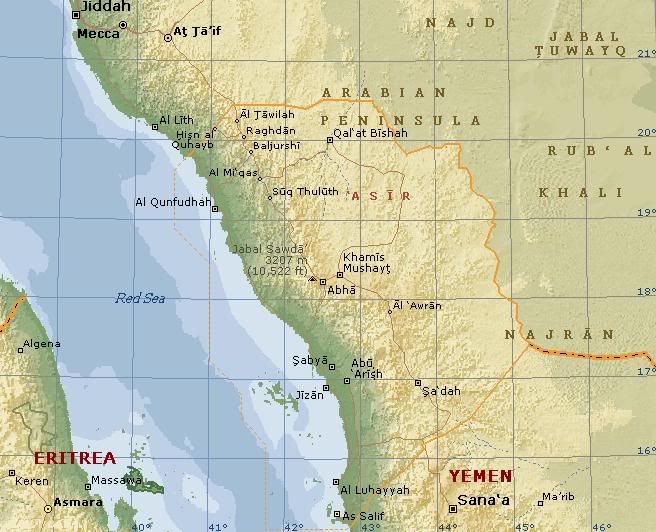
Asir was an Ottoman province until 1917, when the opportunistic Prince Hasan Ali Ibn Aid took power and made Abha his capital. Amidst continuing skirmishes with his neighbours in the Hejaz (to the NW), Yemen, and Nejd & Hasa (to the E), the Prince's control on some of his own subordinates became weak.
In 1920, one of these men, Mustafa Ali Ibn Zeid, became dangerously obsessed with an Indian musician by the name of Raveena Pillai. This led to her abduction in late October of that year. Smuggled out of the country, she was secreted away to Ibn Zeid's palace in the town of As Salif, in Asir's southern corner.
By mid-November, however, Indian investigators had assembled sufficient evidence to demonstrate Asirite compicity in the abduction. A squadron of warships and troop-laden passenger ships were dispatched to As Salif, with a powerful Japanese task force on its heels. Indian efforts to negotiate failed when Ibn Zeid ordered the negotiating team arrested and imprisoned. The Indians then invaded the town, liberating all of the Indians including Ms. Pillai, while killing Ibn Zeid and a number of his supporters. Japanese assistance outside of ship to shore bombardments has long been rumored but never officially acknowledged by either Japan or India.
The Indians occupied As Salif and the immediate area with the intention of rebuilding the town and then departing in mid 1922; however, in this time frame, the House of Saud had launched its campaign to bring the entire Arabian peninsula under its control. By the time the designated Indian departure came around, the rest of Asir was under the heel of the House of Saud.
After a number of bloody skirmishes with soldiers of both Yemen and Saud, India applied to the League of Nations for a mandate over Asir in February 1922. It was not until July 1924 - by which time the Hejaz had also fallen to the Saudis - that the League granted the mandate. It was, however, a much larger one than India had envisioned, perhaps both as a test to India and as an obstacle of sorts to the Saudi's campagining, as the latter were obliged to pull out of parts of the new mandate they had previously conquered.
Since then, India has been busy developing the infrastructure of the new mandate - repairing roads, water, and waste-disposal systems, developing electrical grids in the larger towns. Port facilities at As Salif, Jizan, and Al Qunfudhah have been modernized and expanded. A civil service has also been in training, primarily in Abha, while a defense force of four battalions of mounted infantry has been in training since 1923.
The mandate's economy is currently strong, with its traditional agricultural (coffee, cereal, sheep, fish) and mineral (salt) exports bolstered by Indian investment into infrastructure. The latter has included side-effects such as considerable training of the labour force and the start-up of a number of new Asirite-owned firms capable of taking on contracts. It is believed that as of 1930, Asir's population of 540,000 is perhaps the most highly trained and educated in the Arabian peninsula on a per-capita basis.
A side effect of the Indian occupation has been the development of a significant service sector. Indian Muslims making the pilgrimage to Mecca frequently land at Al Qunfudhah before heading inland for the trek to the border. Consequently, there is considerable demand for accommodation, food, and other basic services in the northern part of the mandate and Asirite entrepenuers are taking advantage of this.
It is expected that India will hold a referendum on the mandate's future in 1934, ten years after the mandate's official creation.